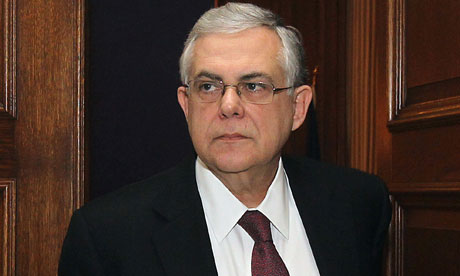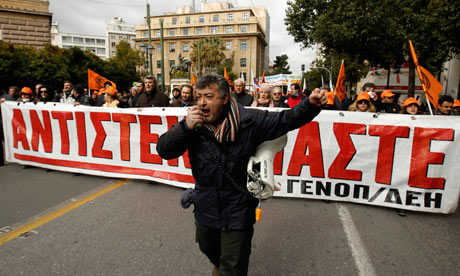It's time to wrap this live blog up after another lively day. Here's a closing summary:
• Greece's coalition leaders say they have accepted the terms of the country's second rescue package, ending days of deadlock. Having failed to agree €300m of pension cuts last night, last-ditch talks with international lenders have delivered 'success' – according to prime minister Lucas Papademos....
• But doubts remain over whether it will be enough to satisfy the rest of Europe. Eurozone finance ministers are meeting now in Brussels, but are not expected to reach a decision tonight. Germany and Ireland have both suggested that the deal agreed in Greece may not go far enough.....
• The agreement has sparked anger in Greece. Unions have called a two-day strike, beginning on Friday. A government minister has resigned, along with a senior member of the New Democracy party.
• The European Central Bank hinted that it could share any profits on its Greek bonds with the rest of the eurozone. However Mario Draghi ruled out taking part in the debt restructuring programme.
• On the UK economic front, the Bank of England raised its quantitative easing programme by another £50bn. It will soon have created £325bn of electronic money. The move came after surprisingly good manufacturing data, and a narrowing of the UK trade gap.
Thanks for reading, and your comments today. I'll be back early tomorrow to carry things on. Good night!
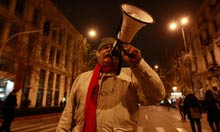 A protester shouts slogans during a rally against austerity measures in Athens. Photograph: John Kolesidis/REUTERS
A protester shouts slogans during a rally against austerity measures in Athens. Photograph: John Kolesidis/REUTERS
In Athens tonight, the squabbling has started again between rival political parties – just hours after they appeared to put their differences aside and back the tough austerity measures demanded in return for its second bailout, worth €130bn.
Politicians have been engaged in an unseeemly rush to distance themselves from the deal. As we flagged up at 4.17pm, a deputy minister swiftly quit.
This was followed by the resignation of a senior member of the conservative New Democracy party. Yiannis Manolis claimed the deal would condemn Greeks to "Bulgarian salaries in a country with Brussels prices."
Aleka Papariga, the communist party leader, had already fired up the rhetoric, claiming that international lenders were determined to force the Greek people into "concentration camp conditions."
The junior party in the coalition is even claiming that it is not part of the agreement. As Helena Smith explains from Athens:
If there was any sense that the brinkmanship on display in the last few weeks is over, it was put to rest last night when Laos, the junior party in the ruling coalition said it had not even been informed about the bailout agreement.As such, it had played no role in resolving the issue of cuts in supplementary pensions, the final obstacle to consensus being reached over the accord.
"We've had no contact all day with the prime minister's office," said Nikos Vasilliades a party spokesman. "The deal only represents the two main parties, Pasok and New Democracy."
My colleague Ian Traynor reports from Brussels that euro finance ministers are piling pressure on Greece to prove it will deliver on its pledges to slash public spending.
Without solid assurances, Greece may still not get its new €130bn bailout – despite its political leaders finally agreeing to the terms of the rescue package today.
Ian writes:
Following weeks of brinkmanship that have poisoned relations between the bankrupt country and its eurozone creditors, the ministers and senior officials from the Eurogroup, the European Central Bank, the European Commission, and the International Monetary Fund are wrangling over whether to activate the bailout to prevent outright Greek insolvency by the end of March when the country has to redeem more than 14 billion euros in debt.
Despite the announcements in Athens and Frankfurt that Greece's coalition government had yielded to savage new terms from the eurozone to qualify for the bailout, it is unclear whether the highly complex new rescue package would be finalised at the meeting in Brussels.
The emphasis, though, is on first getting Greece to deliver its side of the bargain.
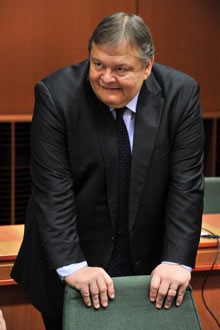 Photograph: John Thys/AFP/Getty Images
Photograph: John Thys/AFP/Getty Images
The word from Brussels is that there's no chance of EU finance ministers ruling tonight whether Greece's agreement is acceptable.
A press conference is expected to be held at 11pm local time, or 10pm GMT.
Many of the pictures coming out of the meeting show finance ministers looking somewhat stressed -- Evangelos Venizelos, for example, appears to be feeling the strain...
That follows the comments from EU finance ministers, questioning whether the deal agreed by Greek coalition leaders actually meets Europe and the IMF's demands.
As reported at 4.22pm, Germany's Wolfgang Schäuble has fuelled fears that Greece may still not have done enough. He told reporters that:
The agreement, as far as I understand, is not at a stage where it can be signed off.
If you're coming to this story late -- the key points are that
a) overnight, Greek leaders failed to agree to €300m of pension spending cuts, but accepted other austerity measures demanded by its Troika of lenders
b) At 3pm today, Lucas Papademos announced that a deal had been reached over this missing €300m. However the statement, which you can see here, is rather short of detail.
More details from Mario Monti's speech in Washington DC (see also 5.41pm)
The Italian PM said he did not expect any country to quit the euro -- instead, he sees "more countries" joining in the future*
On the issue of Greece, Monti urged the IMF to "turn the page" and give Greece the aid it needs, so long as it has met its mininum requirements. Otherwise, he warned, Europe would face a "big potential explosion".
Mario Monti also said that a successful resolution to the bailout debacle in Greece would help Italy by pushing down its borrowing costs (they've already dropped in the last couple of months). He insisted that Italy did not need external financial support itself.
* - Latvia and Romania, for example, already have plans to enter the eurozone in the next few years, and indeed only the UK and Denmark have official opt-outs.
Irish prime minister Enda Kenny has ruled out seeking a Greek-style debt restructuring in the future.
Kenny told Bloomberg Television (see video above) that Ireland will pay its bills "in full and on time", insisting that the country's current rescue plan will give it the time needed to strengthen its economy and return to the financial markets.
Kenny added:
I'm not looking to draw any further monies, I'm looking to emerge from the bailout when we can fly independently ourselves again. So I'm not contemplating a second bailout at all.
Just in from the European Banking Authority -- it is following up the stress tests which is held at the end of last year.
Those tests found that banks needed to find €115bn to withstand further pressure from the Eurozone crisis. Those banks seen as too weak have presented their capital raising plans – and the EBA now wants to check whether those proposals are viable.
The regulator, which has concluded that the capital raisings will reduce lending to the European economy by less than 1%, will release its verdicts in early March. It said this evening that:
The EBA's Board of Supervisors today made a preliminary assessment of
banks' capital plans submitted in response to the EBA's recommendation
on recapitalisation.Their review highlights that, in aggregate, the shortfalls are expected to be met primarily through direct capital measures. The measures are not viewed as having a negative impact on lending into the real economy.
Our banking expert Jill Treanor points out that the aim is to recapitalise Europe's banks without the need for further state handouts.
The EBA also said that it plans to undertake its next EU-wide stress test in 2013.
The Open Europe think tank had helpfully listed the key questions that remain, following today's agreement in Athens:
• What structure will the bailout take (in terms of allocation of funds and distribution of payments)?
• What will the total level of debt reduction from the restructuring be?
• When will the restructuring begin and will it be in time to pay off the €14.4bn in debt maturing on 20 March?
• Will the European and Greek parliaments approve all aspects of the deal?
• What role is the ECB playing? Will it submit its holdings of Greek debt for restructuring?
Full details here.
Mario Monti has begun speaking in Washington D.C. as part of his two-day trip to the US.
The Italian prime minister is banging the drum for a better growth strategy in Europe. Monti said it was important for the G20 to help, but that wide-ranging structural reforms were needed in Italy to restore demand.
Speaking without notes, Monti also reached for a culinary analogy. He described the euro as both an economic and political tool -- a cherry on the cake, but "there was no cake".
Ie, Europe launched a single currency without the fiscal and political integration and tools necessary for it to succeed.
Monti added that to make the euro a success, Europe needs to "make the cake" - through a proper single market. He added that Europe is alreadu moving towards "some degree" of closer political union.
The trip is seen as a valuable opportunity for Monti to get president Barack Obama on his side, over the issue of growth vs spending cuts.
Greek finance minister Evangelos Venizelos has declared that Greece is just one "final step" away from its second rescue package, as he arrived in Brussels for this evening's meeting of eurogroup finance ministers.
Here's the quotes from Venizelos:
After a long and tough period of negotiation, we finally have a staff level agreement with the troika for a new, strong and credible program.
We also have a deal with the private creditors on the basic parameters of the PSI.
We now need the political endorsement of the Eurogroup for the final step.
Venizelos's optimism, though, isn't obviously shared by other senior Euro officials. EC commissioner Olli Rehn points out that the eurogroup needs to be persuaded that Greece can implement the measures laid out in the draft agreement.
Rehn said the Euro finance ministers will have a "thorough discussion" of the deal tonight, but it is up to "the Greek government and parliament' to convince them they can carry it out.
European stock markets closed slightly higher today, with the FTSE 100 finishing 19 points higher at 5895.
David Jones, chief market strategist at IG Index, said traders were in no mood for euphoria despite the 'breakthrough' (if that's what it is) in Greece:
It's been so long a wait for a deal on Greek austerity measures that the reaction was fairly muted, with Wall Street even dipping into the red, helped along the way by a lack of detail.
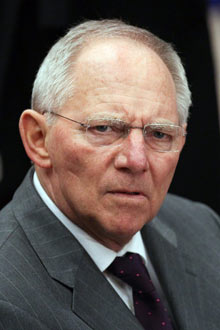 German finance minister Wolfgang Schäuble in Brussels today. Photograph: Olivier Hoslet/EPA
German finance minister Wolfgang Schäuble in Brussels today. Photograph: Olivier Hoslet/EPA
The finance chiefs of Germany and Ireland have both cast doubt on claims that Greece has reached a credible agreement.
In the last couple of minutes, German finance minister Wolfgang Schäuble told reporters in Brussels that it was "still not clear' that Greece can reduce its debt pile to 120% of GDP by 2020. That's the key long-term goal set by international lenders, at the heart of the plan to encourage creditors to take a 'voluntary' haircut on their loans.
Ireland's Michael Noonan said that he was "not sure" a Greek deal has been done.
Reuters is reporting that the Greek deputy labour minister has resigned over the new austerity measures agreed by the three coalition leaders
UPDATE: Yannis Koutsoukos tendered his resignation in a letter to Lucas Papademos this afternoon. He said he was quitting because the measures agreed by the coalition were "painful for working people".
European finance ministers are arriving in Brussels ready for their meeting, which is scheduled to begin at 5pm GMT.
Holland's representative, though, has already warned that they will not take a final decision on whether Greece should receive its second bailout this evening. Finance minister Jan Kees De Jager told reports in Brussels:
There will not be a final deal, but more importantly, we have to see first what the Troika has to report - a Yes or No [on whether] Greece has complied with all actions needed for the release of the second programme.
And Christine Lagarde of the International Monetary Fund said that "there is still work to be done on Greece".
Weighing everything up it looks like we can conclude that the troika backed down over the proposal for Greece's pensioners to take a €300m hit.
Helena Smith reports from Athens:
This is very good news conservative leader Antonis Samaras, who messiah-like, emerged from last night's marathon talks saying that he had "fought" throughout the negotiations for pensions to be dropped from the draconian package of austerity measures.
A cynic, however, might say that throughout the crisis Samaras has had his eye on the polls, his only wish really being his over-riding ambition to become Greece's next PM.
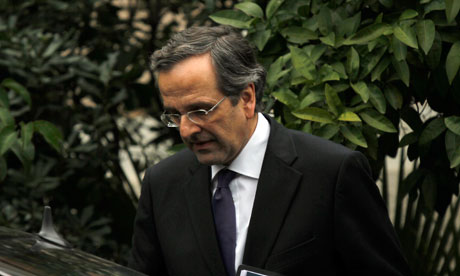 Antonis Samaras, leader of Greece's conservative New Democracy party, who opposed pension cuts. Photograph: Kostas Tsironis/AP
Antonis Samaras, leader of Greece's conservative New Democracy party, who opposed pension cuts. Photograph: Kostas Tsironis/AP
As IfigEusLannuon explains in the reader comments, the next Greek elections need to be held by October 2013. However, when Papademos was installed as non-elected head of state, it was broadly agreed that elections would be held this April. Pasok (the socialist party that ran Greece until November) would like the election postponed -- Samaras's New Democracy want them in April.
It will be very interesting to see when Samaras demands that Papademos' interim government make way for elections to be held.
The International Monetary Fund is continuing to work with the Greek government on the details of its new rescue package, following the agreement reached today.
The IMF is holding a press briefing in Washington now. Spokesman Gerry Rice told reports that today's deal is a valuable step forward.
An important initial step was to get the agreement among the coalition leaders in Athens, and the next step is to continue the discussions on that basis.
The IMF will be determined to see that the details of the bailout deal are implemented. That is far from clear -- the two-day strike scheduled to begin tomorrow underlines the deep public anger over the extra austerity that Greece will be asked to swallow.
Under the plan agreed last night, the minimum wage will fall by around 20% and as many as 15,000 civil servant jobs will be cut this year.
Here's the official statement from the Greek prime minister's office:
Ολοκληρώθηκαν σήμερα το πρωί με επιτυχία οι διαβουλεύσεις της κυβέρνησης με την τρόικα, σχετικά με το θέμα, το οποίο είχε απομείνει ανοικτό για περαιτέρω επεξεργασία και συζήτηση. Οι πολιτικοί αρχηγοί συμφώνησαν με το αποτέλεσμα των διαβουλεύσεων αυτών. Κατόπιν τούτου υπάρχει γενικότερη συμφωνία για το περιεχόμενο του νέου προγράμματος εν' όψει και της αποψινής συνεδρίασης του Γιούρογκρουπ. Όπως είναι γνωστό, το πρόγραμμα συνοδεύει τη νέα δανειακή σύμβαση με την οποία η Ελλάδα θα χρηματοδοτηθεί με 130 δισεκατομμύρια ευρώ», αναφέρει η ανακοίνωση που εξέδωσε το γραφείο του Πρωθυπουργού.
Which means:
Negotiations between the government and troika were completed this morning with success regarding the one issue which had remained open for debate and re-assessment.
The political leaders agreed with the results of these negotiations. As a result, there is general consensus for the content of the new programme ahead of tonight's Eurogroup meeting. As is known, the programme is part of the new loan agreement with which Greece will be financed with €130bn euro.
Not a hugely detailed statement.....
Reports are now coming in that this afternoon's agreement was clinched during all-night negotiations between Greek PM Lucas Papademos and representative of the country's "troika" of creditors [the EU, the ECB and the IMF].
Word from Greece is that at least half of the €300m euro shortfall* will be covered through "further cuts" in public spending.
It is unsure how the rest will be accounted for, Helena Smith reports from Athens. The government appears to have kept this deliberately vague.
* - if you're just joining us, that shortfall was created because Greek political leaders refused to accept €300m of cuts to pensions, which was part of the deal for its second bailout programme.
The announcement has been made. Prime minister Lucas Papademos's office says that the party chiefs have agreed on the terms set by the Troika in return for Greece's second bailout.
State-run TV is saying the Greek finance ministry Evangelos Venizelos had to have "something in his hands" to present to his counterparts at the eurogroup meeting this evening (that's via Helena Smith in Athens). That meeting starts in just two hours time.
Still looking for the details.... And as Gemma Godfrey, chairman of the investment committee of Credo Capital points out on Twitter, there is still work to be done:
Greece agrees to austerity deal -now private bondholders must agree to restructuring&ministers must find the bailout money!
— Gemma Godfrey (@GCGodfrey) February 9, 2012
Mario Draghi won a laugh from journalists in Frankfurt when he described Greece as "unique", when explaining the European Central Bank's approach to the country.
Greece is unique.
Everything about Greece is unique.
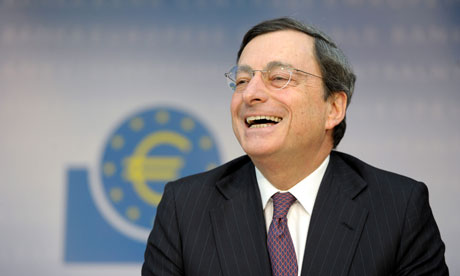 European Central Bank governor Mario Draghi today. Photograph: Thomas Lohnes/AP
European Central Bank governor Mario Draghi today. Photograph: Thomas Lohnes/AP
Draghi added that the ECB did not have a Plan B for Greece, and was confident that it will fulfill the terms for its second rescue package. As he put it:
To have a Plan B is to admit defeat.
The ECB president said that he "hears" that negotiations with its creditors are going well and an agreement is 'close". Draghi also denied reports that the ECB would take any losses on its Greek debts as part of the country's rescue deal, and ruled out any "legal tricks" to help Greece.
I am sorry to say I cannot say anything about how our holdings of Greek bonds will be treated.
Interestingly, though, Draghi did say it would be legal for the ECB to share any profits on its Greek bonds among its members (these bonds were bought at distressed prices in the secondary bond market).
As expectation mounts in Athens we are able to finally reveal a time for the much-awaited announcement the government will make regarding "closure" of the deal.
"It will be issued in less than half an hour", government spokesman Pandelis Kapsis has just told Helena Smith, our Athens correspondent.
A reminder of the current situation -- Greek political leaders refused to accept around €300m of cuts to pensions in Greece, at last-night talks yesterday. That has left Greece short of the €3.3bn of austerity measures sought by international lenders in return for its second bailout.
When the announcement is released, the key question will be whether leaders have changed their minds of the pensions issue, or have found another way of making the saving.
Mario Draghi, head of the European Central Bank, has confirmed that the Greek government has reached a deal over the outstanding issues surrounding Greece's second bailout.
Draghi told reporters in Frankfurt that Greek prime minister Lucas Papademos had phoned him in the last few minutes and declared that an agreement has been reached and endorsed by the major Greek political parties.
Draghi added that the Greece austerity deal will be discussed by eurozone finance ministers in Brussels tonight.
State-run TV is also now reporting that there has been an agreement.
It appears that the Greek government is very keen to downplay any suggestion of failure ahead of tonight's eurogroup meeting of finance ministers. At this meeting, Greek finance minister Evangelos Venizelos will present the "last version" of the accord outlining the terms under which Athens will receive its second rescue package.
The Greece PM's office is now confirming that a deal has been struck between the coalition leaders over the new austerity measures needed for a second bailout.
But there is still a big question mark over whether George Karatzaferis, who heads up the junior coalition partner Laos, is on board.
Government spokesman Pandalis Kapsis told Helena Smith in Athens that:
An announcement can be expected soon.
We have the two principal parties on board ... we are researching whether Georgios Karatzaferis [the leader of Laos] will also agree.
Meanwhile, just to add to the suspence officials from the New Democracy party, another coalition member, are refusing to confirm or deny the rumours, says Helena.
The Financial Times is reporting that a deal has been reached in Athens over the outstanding issues around the bailout agreement.
Their Athens correspondent, Kerin Hope, states that:
An official in the prime minister's office says: "There's an agreement, Mr Papademos has met with Mr Samaras and it's done. There will be a statement shortly."
That's given stock markets a lift -- the FTSE 100 is now up 36 points. More as we get it....
Over in Greece, the old idea of calling a referendum over the draconian terms of the bailout deal has once again been raised.
Speaking to Flash Radio, the prominent socialist Pasok party MP Haris Kastanides said it was was "vital" that Greeks at large give their consent to the austerity measures, as successive governments will be bound by them.
Kastanides said:
At some point we have to seriously think about this idea again. Giving the people a say is the greatest form of democracy.
I don't want to go over that painful issue again....But it is the fairest way.
You may remember that back in November, Pasok leader George Papandreou flirted with the idea of a public vote on the terms of the €130bn bailout. This was a devastating political miscalulation. A roasting from German chancellor Angela Merkel and French president Nicolas Sarkozy forced Papandreou to backtrack. He then won a midnight vote of confidence (that was a day to remember), and stepped aside in favour of Lucas Papademos.
Kastanides was one of the people who persuade Papandreou to call the referendum in the first place, along with several Harvard academics.
From Athens, Helena Smith says that while it might seem like old hat, the referendum idea should not be excluded.
Bankers on Wall Street who watch Europe and the debt crisis closely are privately betting on a referendum eventually taking place in Greece, say my sources who are in close contact with financiers there.
The European Central Bank has voted to leave interest rates unchanged across the eurozone, at 1%.
Like the Bank of England 45 minutes ago, the ECB acted in line with expectations. Monetary policymakers must feel this isn't a day for surprising the market.
The interesting stuff will happen in 45 minutes time, when ECB head Mario Draghi answers questions from the media. Expect a grilling on whether the ECB might exchange its Greek bonds for securities issued by the EFSF.
Even by the standards of Greek political theatre, little can be ruled out in the 72 hours between now and the time the tough bailout agreement will be brought to the Greek parliament on Sunday, says Helena Smith in Athens.
"The whole situation is in flux," Nikos Vasilliades , a press spokesman at the small nationalist Laos party has just told Helena.
Vasilliades continued:
Logically the agreement should go to parliament to be voted on this Sunday but who knows? Our president [Laos leader George Karatzaferis] has made it clear that he will not be signing anything until he is assured that the measures being asked of us are legal.
Karatzaferis wanted "cast iron" guarantees from three institutions: Greece's High Court, its Central Bank and the European Parliament. The party is now awaiting the response of letters the 66-year-old Karatzaferis had sent all three.
Spokesman Vasilliades claimed that many of the measures in the draft bailout agreement "violate international labour law" and breach the Lisbon Treaty:
They will affect an entire nation for the next 15, 20 years so we need to be sure, we need to have an answer. Yes, you could say we are buying time.
The Bank of England cited the "significant margin" of slack in the British economy as a key reason for creating another £50bn of electronic money to spend on UK government bonds. It warned that "tight credit conditions" and "fiscal consolidation" were presenting a "headwind", slowing economic growth.
Katie Allen has the full story about the Bank of England's latest QE injection, here.
Breaking -- the Bank of England has increased its quantitative easing programme by another £50bn, to £325bn
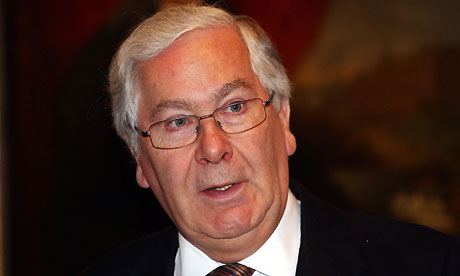 Sir Mervyn King, governor of the Bank of England. Photograph: David Jones/PA
Sir Mervyn King, governor of the Bank of England. Photograph: David Jones/PA
The Bank also left interest rates unchanged at 0.5% -- where borrowing costs have been pegged since March 2009.
Both decisions were broadly in line with City forecasts. Next up -- the ECB at 12.45pm GMT.
Vodafone has revealed this morning that it is pulling takings out of its Greek subsidiary "every night".
Chief Financial Officer Andy Halford told reporters that the mobile network giant is repatriating cash to the UK on a daily basis, and also making contingency plans for a Greek disorderly defauly.
Ealier, Vodafone had reported that weaker trading in Italy and Spain had undermined a stronger performance in Northern Europe.
Severeal major corporates are protecting themselves from a collapse in the eurozone. On Tuesday, GlaxoSmithKline admitted that it is shifting cash out of European banks and back into Britain.
The European Union has been briefing journalists in Brussels about the latest developments in Greece.
EU spokesman Amadeu Altafaj told reporters that there was "some room for flexibility" in the ongoing negotiations. However he declined to confirm the claim that Athens has 15 days to find the missing €300m -- which rather backs up Dow Jones's claim that they've only got until Sunday.
Altafag also told the briefing that the negotiations with Greece are concluded – the eurogroup must now decide whether it has met its side of the deal.
Greece may not have 15 days to find €300m in missing savings.... Dow Jones is reporting that they've only got until Sunday:
We are told #Greece has till Sunday to find EUR300mil to cut in its 2012 budget, need not be from pensions spending @djfxtrader @WSJ
— Matina Stevis (@MatinaStevis) February 9, 2012
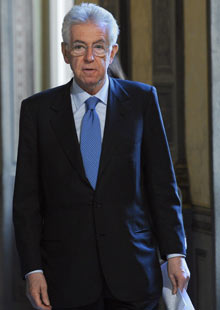 Mario Monti at the Chigi Palace in Rome earlier this week. Photograph: Ettore Ferrari/EPA
Mario Monti at the Chigi Palace in Rome earlier this week. Photograph: Ettore Ferrari/EPA
Mario Monti's visit to America today is a crucial opportunity for Europe to persuade the US that it is serious about fixing the eurozone crisis.
Monti's stock is pretty high since replacing Silvio Berlusconi as Italy's prime minister. With a responsible adult at the helm, Italy's bond yields have dropped (thanks also to that other Mario in the ECB). EU insiders say that Monti's credibility means his calls for a larger European bailout fund, and a focus on growth, carry plenty of weight.
Italian government officials are briefing that Monti will use his meeting with Obama to promote the idea of a new European growth strategy, which would probably involve some debt and deficit targets being relaxed.
This argument could be welcome in Washington, where the Obama administration has taken a more Keynesian approach to the crisis, and is now seeing robust economic growth.
Philippe Moreau-Defarges, a researcher at Paris-based French Institute of International Affairs, told Bloomberg that Monti will be batting for Europe:
There's no European more important for Obama to meet right now to understand that European leaders are aware of the problems and are dealing with them.
Tomorrow's strike action has been called amid heated debate in Athens this morning, as the rhetoric from trade unionists increases.
As this picture shows, militants from the power power corporation (DEH) have already taken to the streets, our correspondent Helena Smith reports:
Photograph: Yiorgos Karahalis/Reuters
To a man, commentators are saying that Greece has been unfairly cornered - faced with the option of two brutal choices, bankruptcy or the sort of belt-tightening that will thow it further into "economic Armageddon," a fiscal dark age of no growth, no development and no prospect of productivity or salvation on the horizon.
"We are bankrupt but in order not to call us bankrupt they are giving us this money on terms that are so punitive that it will make us even more bankrupt," said Spyros Haritatos, one of the country's most popular radio show hosts."They are doing this to ensure that we don't make others [in Europe] bankrupt. With such measures how will Greeks survive? How will they be able to even marry?"
Union leader have called a two-day strike starting tomorrow, as anger in Greece over the deal agreed last night bubbles away.
The two major Greek unions, GSEE and ADEDY – who represent around half of all Greek workers – announced the walkout as part of a "social uprising" against the austerity measures that were agreed by Lucas Papademos, George Papandreou, Antonis Samaras and George Karatzaferis.
The industrial action will come just three days after a general strike across Greece. The unions plan to hold protest rallies outside parliament on Friday and Saturday, and will return on Sunday when MP are likely to vote on the plan.
ADEDY secretary general Ilias Iliopoulos told Reuters:
The painful measure that creat misery for youth, unemployed and pensioners do not leave us much room. We won'e accept them.
We are moving to a social uprising.
Greek youth unemployment rate has now reached 48%, according to this morning's data (see also 10.05am). That's up from 22.4% back in 2008 when the financial crisis began.
Grim economic news from Greece this morning -- the unemployment rate hit 20.9% in November, a new record high. Industrial output tumbled by 11.3% in December, compared with a year ago..
Another sign of Greece's continuing economic contraction. Duncan Weldon, economist and TUC senior policy advisor, pointed out that the data shows the country will struggle to grow its way out of the crisis:
Meanwhile - Greek industrial production down over 11% year on year. Not much hope of an improving trade balance at this rate.
— Duncan Weldon (@DuncanWeldon) February 9, 2012
Katie Allen, my colleague on the economics desk, explains what today's UK trade and industrial/manufacturing data (see 9.35am) means:
The numbers for both industrial production and trade are ahead of forecasts and should help allay fears that Britain is headed into recession - technically two consecutive quarters of contraction. The official data from the fourth quarter of 2011 indicated the economy shrunk 0.2%.
Not only did manufacturing output rise 1% in December, November's contraction was revised up to -0.1% from -0.2% previously reported by the ONS.
Still, two notes of caution:
Manufacturing makes up only 10.2% of the economy. The wider industrial sector, which also covers mining and utilities, makes up 15.4% of the economy. Secondly, the improvement in the trade balance was largely driven by a drop in imports - not exactly proof of burgeoning domestic demand. The pick-up in exports was very slight, a blow to government hopes for overseas trade to drive recovery and a longer-term rebalancing away from dependence on domestic demand.
Britain's manufacturing output has jumped, beating City forecasts.
Data just released showed that manufacturing output rose by 1% in December, with output across all industry (including energy utilities) growing by 0.5%.
That could ease fears that Britain will suffer a double-dip recession. However the Office for National Statistics also reported that industrial production fell by 1.4% during the final three months of 2011 (it declined in October and November) - slightly more than predicted by the ONS when it estimated that UK GDP fell by 0.2%.
As economics editor Larry Elliott points out:
The bounce back in manufacturing output had been predicted because the survey evidence for December had been strong.
Seperately, the UK total trade gap in goods and services has dropped to its lowest in almost a decade -- £1.1bn in December 2011. Mainly due, though, to falling domestic demand rather then resurgent exports.
The trade gap in goods declined in December to £7.111bn, the smallest level since February 2010. That was mainly due to a decline in imports – down from £34.25bn in November to £32.67bn in December. Exports inched a little higher – from £25.34bn to £25.56bn.
The UK also ran a services trade surplus of slightly above £6bn in December.
Quite a packed agenda today, with plenty of British economic data this morning, and the interest rate/QE decisions at lunchtime.
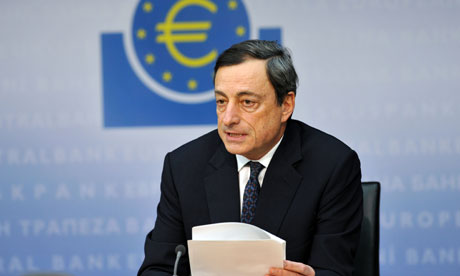 European Central Bank president Mario Draghi will hold a press conference this afternoon. Photograph: KeystoneUSA-ZUMA / Rex Features
European Central Bank president Mario Draghi will hold a press conference this afternoon. Photograph: KeystoneUSA-ZUMA / Rex Features
The Super Mario Brothers will be busy - while ECB head Mario Draghi fields questions in Frankfurt, Italian PM Mario Monti will be visiting the US.
• UK industrial+manufacturing production stats for December - 9.30am GMT
• UK trade balance - 9.30am GMT
• Bank of England interest rate/QE decision - noon GMT
• European Central Bank interest rate decision - 12.45pm GMT / 1.45pmCET
• ECB press conference with Mario Draghi - 1.30pm GMT / 2.30pm CET
• US weekly initial jobless claims data - 1.30pm GMT / 8.30am EST
• Eurogroup meeting in Brussels - 5pm GMT / 6pm CET
• Mario Monti speaks at the Peterson Institute - 5.30pm GMT / 12.30pm EST
There don't appear to be any bond auctions today.
The euro is rising today, and European stock markets have also opened higher.
The euro hit $1.3312 against the US dollar, on optimism that the final details of the agreement will be ironed out. In London, the FTSE 100 is up 21 points at 5897, close to its highest point of 2012.
As City veteran David Buik points out, stock markets have rallied strongly over the past few months despite the uncertainty in Greece.
Since Oct 2011 S&P 500 +22%, DOW +20.9%, FTSE +20%,.Since Sept 2011 DAX UP 34%!! GREEK EQUITIES +48.3%!! Bull market?Hard to believe!
— David Barlow Buik (@DavidBuik) February 9, 2012
George Karatzaferis, the junior partner in the coalition, initially declared that he opposed the agreement, only to later clarify that he would continue to support the coalition government
Greek news website ekathimerini.com reports:
Leaving the Maximos Mansion, Karatzaferis quoted a poem by Constantine P. Cavafy, suggesting that he had rejected the deal.
On returning to his party's headquarters, he clarified that he objected to signing the agreement because he did not have enough time to study it.
Despite having it translated into Greek especially?
Karatzaferis's comments have caused some bemusement in Greece, with Athenian Diane Shugart pointing out that you either back the deal, or you don't.
ps someone should tell mr karatzaferis that agreeing albeit with serious reservations is like being a little pregnant #greece
— Diane Shugart (@dianalizia) February 9, 2012
Sony Kapoor, managing director of the Re-Define think tank, also isn't impressed with the comments coming out of Athens:
Methinks there is a lot of posturing re #Greek deal, primarily for domestic audiences in #Greece & #Germany
— Sony Kapoor (@SonyKapoor) February 9, 2012
Greek finance minister Evangelos Venizelos struck an optimistic tone as he headed to Brussels to present the results of last night's talks to the Eurogroup (made up of the 17 finance ministers from countries within the euro).
Venizelos said:
I leave for Brussels with hope that the Eurogroup will take a positive decision concerning the new aid plan.As the prime minister said, there is agreement on all the issues bar one.
Christine Lagarde of the International Monetary Fund will also attend this afternoon's meeting in Brussels.
Gary Jenkins, City analyst at Evolution Securities, suggests that Greece may be hoping that the EU decides to let them off the last €300m. Possibly, but on the other hand Athens's 'goodwill bucket' is running pretty dry.
Jenkins also questioned whether the agreement could actually be implemented:
Whether an agreement will survive the April election, let alone the years of economic hardship to come, is a moot point. Apparently the terms of the agreement are based upon (amongst many other things) Greece returning to economic growth in the first half of 2013, which may be a tad optimistic.
Prime minister Lucas Papademos held talks with Greece's Troika of lenders (the IMF, the ECB and the EU) overnight after the talks with Papandreou, Samaras and Karatzaferis broke up.
Reuters is reporting that Greece has been given another two weeks to find €300m in alternative savings, if the pensions issue really cannot be resolved. According to an unnamed official:
Greece has another 15 days to specify fiscal savings worth 300 million euros.
On a positive note, plenty of progress was made at last night's talks, which lasted over seven hours.
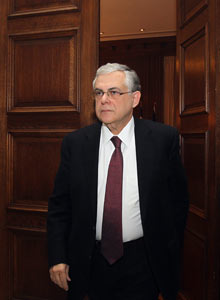 Greek prime minister Lucas Papademos, entering the meeting room at Maximos mansion last night. Photograph: Orestis Panagiotou/AP
Greek prime minister Lucas Papademos, entering the meeting room at Maximos mansion last night. Photograph: Orestis Panagiotou/AP
George Papandreou (head of PASOK - socialist), Antonis Samaras (New Democracy - right wing) and George Karatzaferis (Laos - far right) agreed to around €3bn of austerity measures. That includes hefty cuts to the minimum wage, and up to 15,000 job cuts across the civil service.
Pensions, though, remained the sticking point, leaving technocratic PM Lucas Papademos around €300m shy of his target of €3.3bn of savings for 2012.
With elections looming, it appears that no-one wanted to be seen as reponsible for cutting money to the elderly. It appears that New Democracy would not accept cuts to supplementary state pensions, while Pasok would not accept cuts to the primary pension.
Samaras declared last night that he did not have the right "not to negotiate hard" for Greek pensioners:
During these difficult times, we must look at ordinary people, at the pensioner.
Panos Beglitis, a spokesman for the Pasok socialist party, told journalists in Athens that his party were also opposed to cuts in main pensions. He added that the three leaders had accepted that the minimum wage would drop by 22%.
Good morning, and welcome to our rolling coverage of the eurozone crisis.
Overnight, Greece's leaders have failed to agree to the full terms of its £130bn bailout package. Despite negotiating until nearly dawn, the coalition government headed by Lucas Papademos could not agree the details of cuts to pensions.
This leaves Greece short of around €300m of savings needed to persuade its international lenders to approve its second rescue deal.
Despite the hitch, the full Greek cabinet is due to meet later today to decide whether to rubber-stamp the new austerity programme. Evangelos Venizelos, the Greek finance minister, is heading to Brussels to present it to finance ministers from across the eurozone
But with €300m still to find, will Venizelos get a warm welcome from the eurogroup?
It's going to be a busy day. Both the Bank of England and the European Central Bank will announce their latest monetary policy decisions this lunchtime -- Britain could get more quantitative easing, while ECB chair Mario Draghi will be quizzed on the euro crisis.

